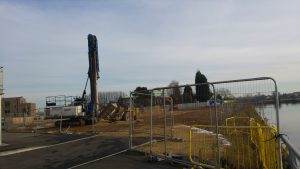Following a busy year for Nottingham’s flagship energy model, Project SCENe, and lots planned for the New Year, it is worth using this month’s blog to sum up some of the recent fruits of the labour.
Firstly, months of behind the scenes research and development at the University of Nottingham and with Integrated Environmental Solutions, has now resulted in the latest addition to the community hub being installed and ready for public use: a 147inch, multi-user, touch-screen monitor linked to real-time and aggregate energy data and tailor-made software allowing people to interact with energy in a way they’ve never done before. These multi-dimensional methods, their simplicity and the monitor’s floor to ceiling design facilities people of all abilities to utilise and benefit from this. The aim is to make energy easy and compelling to understand, improve and realise its potential as a fulcrum for wellbeing and resilience rather than an unseen part of daily life with limited benefits to society or sustainability.

147inch, 12 ft monitor displaying the energy interaction model.

Multi-directional touch-screen and 3D model to encourage social interaction and sustainability through energy.
The monitor is part of a suite of methods to support this, including voice-activated helpers, bespoke and mainstream social media platforms, a customised smart metering app compatible on any smart device, and community-based activities. This aligns energy innovations and required behaviours with everyday goods and practices, making them easier to use, improve and benefit from as we go about our normal routines. By showing community averages of household energy use data and comparative monetary and carbon costs and savings, residents will also be able to more easily translate energy behaviours to meaningful impacts and compare their data with the community as a whole, giving them an instant anonymous local standard to compete against. We could then add to this by having accompanying visuals that show how their household and community consumption, costs, savings and income from the project compares to the regional and national average for equivalent homes.

Demonstrating the model, smart meters and voice-based energy control in the community energy hub. Use the model yourself here.
The monitor is in the Trent Basin ‘community hub’, a physical space within Blueprint’s Trent Basin housing development provided for the residents and wider public to learn about and contribute to Project SCENe. Residents can pop in and use and book it out for events anytime. Non residents can contact Blueprint or us at Project SCENe to arrange a visit. It compliments other physical and online interactions and engagement methods within and between the community and project, such as through films, events, Twitter, Facebook and Stickyworld, aimed at making energy more participatory, empowering and inclusive. Find out more, share your photos and stories and have your say through these.

Laying the foundations for the largest community battery in Europe.
The final news to highlight here is that Project SCENe’s 2.1 MW battery is one step closer to coming online following construction work preparing the foundations this month. The work included reinforcing the concrete upon which the 2.1 MW battery, the largest community energy battery in Europe, will sit. The battery will be charged from rooftop and local solar photovoltaics within the Trent Basin site and discharge into the national grid at peak demand, generating surplus income for shareholders of the project, including residents, and reduced energy prices for residents. Residents decide how this surplus is distributed and invested and can increase it further through their energy practices. Project SCENe will support this, including with expertise from the University of Nottingham and previous energy projects and SmartKlub, an award winning energy company this month granted the Social Impact Technology of the Year Award. It comes amid greatly increasing interest in batteries and local business models for revolutionising energy systems, enabling equitable energy solutions growing vibrant communities and green economies. Project SCENe will epitomise this.
Blog by Lewis Cameron, Research Fellow, Project SCENe, University of Nottingham



